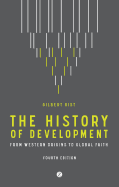In the fourth edition of this influential development text, Gilbert Rist aims to trace the concept of development from its origins in the Western view of history, through the early stages of the world system, the rise of US hegemony, the supposed triumph of the third world, through to new concerns about the environment and globalization. Kate Donald disagrees with some of the author’s key arguments though finds that much of his analysis is deeply relevant and demands serious thought.
 The History of Development: From Western Origins to Global Faith. Gilbert Rist. Zed Books. 2014.
The History of Development: From Western Origins to Global Faith. Gilbert Rist. Zed Books. 2014.
This book, now in its fourth edition, has been described as “to date, the most consequential and scholarly critique from the left of the development project” (David Rieff, in a review of Easterly’s The Tyranny of Experts, a work that arrives at similar conclusions from a different starting point). Gilbert Rist takes the reader on a fascinating tour of development trends, paradigms and reinventions ranging from Aristotle to the Millennium Development Goals, although he is certainly more interested in deconstructing the ideas, practices, and discourse of ‘development’ than attempting a dispassionate overview of its history.
Rist identifies the roots of modern development ideas in the ideology of the Enlightenment, but (dis)credits President Truman’s 1949 inaugural address with ushering in “the development age”. Chapter 4 is dedicated to exploring the rationale, implications and repercussions of this speech, with its famous ‘Point Four’ arguing that the United States should use its technical knowledge and investment power to improve the plight of people in “underdeveloped” countries. Rist claims that Truman pioneered the seductive idea of development as a final state (at which the industrialised nations had of course already arrived), towards which it was possible to usher those ‘underdeveloped’ countries a few rungs down the ladder of progress – if only they would do what they were told.
The discussion of Point Four reveals many of Rist’s problems with development, which he sees as based on the lionization of economic growth and the primacy of GDP above all else. Truman – and countless politicians, experts and technocrats since – presented development as “a set of technical measures outside the realm of political debate” and elided the international political / economic systems that cause poverty and inequality. This is all hard to disagree with for anyone who has looked at development policies and practices with even a slightly critical eye. But Rist goes much further. Development is intrinsically destructive (to the environment, to social relations, to non-Western cultures); neo-colonial; a problem masquerading as a solution that causes far more misery than it alleviates. He characterizes development as a “modern religion” of sorts, a faith that people cling to against all the odds and evidence, a “fetishistic” term. In Rist’s view, development is a self-interested Western project, which “has never been more than a pretext for expanding the realm of the commodity”.

This portrayal of development is at times painfully incisive. Rist is surely right to highlight the power relations and root causes so often neglected by development efforts, reports and resolutions, and the myopic and often destructive obsession with economic growth that dominates most ‘development’ plans. However, his eagerness to dismiss any redeeming features of all past, present and future development approaches is a little too glib. Although there are myriad examples of misconceived development projects – some of which have trampled all over the rights of the poor – the development that he decries has lifted many millions of people out of dire poverty. In the last chapter he outright rejects the possibility for alternative conceptions of development de-linked from profit motive, predatory capitalism and the single-minded pursuit of growth, without a truly satisfactory answer as to why such a thing should not be possible and desirable.
Essentially, Rist argues that all practices and policies of ‘development’ should be discarded, and dismisses critics who highlight his inability to present an alternative as merely imprisoned by the existing paradigm (“if previous measures have not produced results, then others need to be suggested fast – as it assumed that ‘development’ is both necessary and desirable”). Yet he himself admits that extreme poverty is “unacceptable”, and when he does briefly sketch a post-development future (apparently involving social movements, autonomy, breaking loose from monetary exchanges, and the large-scale retreat of the State) we are left puzzling as to how another Gilbert Rist would not simply dismiss that as a form of development too. Which leads us to question: is this all mere semantics?
Some aspects of the book are out-dated (it was first published in English in 1997, although this edition does include a new introduction and a new chapter). For example, Rist claims it is socially taboo to express doubts that economic growth can solve all society’s ills. This is manifestly untrue at this point in time. There are many prominent public figures and institutions that question current neo-liberal economic and development paradigms; even the IMF has retreated from an uncomplicated promotion of growth above all else. Many development actors are far more concerned with the distribution of wealth rather than promoting further overall accumulation. Interestingly, Rist barely mentions human rights, or the rights-based approach to development, which is a significant omission given that in theory at least, all United Nations agencies as well as many governmental and non-governmental development organizations now use the framework of international human rights law and principles to guide their work. It is easy to predict, however, Rist would scoff at this approach simply as the emperor’s new clothes.
Undoubtedly however, much of his analysis is deeply relevant and demands serious thought. The book includes enlightening content on several current challenges, including the Millennium Development Goals and by implication the Sustainable Development Goals currently under negotiation. Chapter 14, written for the fourth edition, includes an insightful consideration of the financial crisis and its aftermath. The spread of austerity causes Rist to ask whether the old developed/developing links can be sustained – can we really view Greece, Spain, Ireland or Portugal as ‘developed’ when they “now suffer the same ills as the habitual recipients of their aid”? Nevertheless, the architects of European austerity obsess publicly over a ‘return to growth’, revealing their conviction that ‘development’ only happens in ‘poor’ countries.
The History of Development is a challenging, thought-provoking and sometimes infuriating book. Placing the ills of humanity at the door of development is undoubtedly overblown: human suffering has been around a lot longer than ‘development’ has. Furthermore, the implications of Rist’s argument are unclear, and unexplored. He acknowledges that at its root the idea of development intervention is based “on the grounds that one cannot remain passive when one is confronted with extreme need”, and that the existence of dire poverty is “unacceptable”. Yet, it is never clear how Rist believes that a ‘post-development’ world would deal with these realities. Nevertheless, his critique is as essential as it is provocative, and should undoubtedly be read by anyone with an interest in development, international relations, or economics. Although the reader may not close the book convinced of the desirability of a world without development, it is difficult to shake the lingering sense that our social justice imaginary may be profoundly constrained by the predominance of ‘development’ practice and discourse.
Kate Donald is a human rights researcher and advocate. Since graduating from the LSE with a Masters in Human Rights in 2009, she has worked as Adviser to the United Nations Special Rapporteur on extreme poverty and human rights, at the International Council on Human Rights Policy and the UN Office of the High Commissioner for Human Rights in Geneva. Read more reviews by Kate.








4 Comments